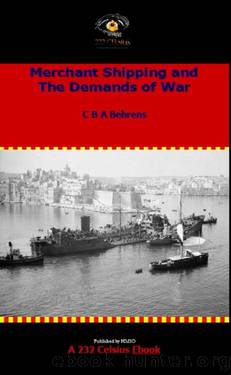Merchant Shipping and the Demands of War by C B A Behrens

Author:C B A Behrens [Behrens, C B A]
Language: eng
Format: epub
Publisher: HMSO - 232 Celsius
Published: 2014-07-08T22:00:00+00:00
Footnotes
[1] In fact (see Appendix XXXVIII, p. 247) Egyptâs imports, including many vitally necessary imports, had fallen by a larger proportion than the United Kingdomâs.
2 i.e. of 1,600 gross tons and over.
3 These were the S.L. (Homeward) convoys, started on 14th September 1939. The O.S. (Outward) convoys did not start till 27th July 1941.
4 And after Pearl Harbour in the services between North America and the Middle East via the Pacific. See Chapter XIII below.
5 These were shipped to Takoradi itself, and indeed each colony had to be supplied through its own ports, but the heaviest burden fell on Freetown, not only a military base, but a naval base and a base for the aircraft engaged in convoy protection. It was the only port in the area in which there were serious difficulties.
6 This was when W.S.12 and O.S.7, with fifty-four ships in all, arrived simultaneously on the 14th October.
7 The writer bases this assertion on the fact that there were no serious complaints, as there obviously would have been if there had been any significant loss of time.
8 The writer bases this assertion on the following (admittedly somewhat skimpy) evidence:
(i) Various statements made by the Ministry of War Transport Representative in Freetown about the numbers of ships that missed the S.L. convoys in January, February, May and âearly Juneâ 1941. The figures for these months were respectively 5, 11, 8 and 8. If one were to take 8 as the average, and to assume a delay of 10 days, then 80 ship-days must have been lost a month, or 960 per annum. Assuming 2*5 months for the round voyage across the Atlantic and 1 ton of cargo per gross ton and an average ship of 5,000 g.t. this would be equivalent to the loss of 64,000 tons of imports into the United Kingdom per annum. In the case of the outward-bound ships sailing independently equal difficulties must have produced smaller delays since there were no convoys to catch.
(ii) The fact that the ships carrying cargo for West Africa were only about seven a month in the second half of 1941. Not all of these, however, can have gone to Freetown and the number was probably smaller in the first half of the year. But even if one were to assume that the monthly average throughout the year was seven and that all went to Freetown, and even if one were to assume further that each suffered ten daysâ delay (whereas in fact, though some suffered a longer delay, the average seem likely to have suffered less), the loss would be smaller than in (i) above.
9 It was decided that henceforth âthe discharge of mechanical transport and maintenance ships in the Middle East should be transferred to commercial agencies as soon as practicable leaving Sea Transport Organisation to deal with troopships, hospital ships and operational shipsâ.
10 Because of the urgency of the need it was held that shipsâ time must if necessary be sacrificed, and that the Ministry âshould have
Download
This site does not store any files on its server. We only index and link to content provided by other sites. Please contact the content providers to delete copyright contents if any and email us, we'll remove relevant links or contents immediately.
| Africa | Americas |
| Arctic & Antarctica | Asia |
| Australia & Oceania | Europe |
| Middle East | Russia |
| United States | World |
| Ancient Civilizations | Military |
| Historical Study & Educational Resources |
Magic and Divination in Early Islam by Emilie Savage-Smith;(1533)
Papillon by Henry Charrière(1429)
Bohemians, Bootleggers, Flappers, and Swells: The Best of Early Vanity Fair by Bohemians Bootleggers Flappers & Swells- The Best of Early Vanity Fair (epub)(1400)
Ambition and Desire: The Dangerous Life of Josephine Bonaparte by Kate Williams(1385)
Twelve Caesars by Mary Beard(1313)
Operation Vengeance: The Astonishing Aerial Ambush That Changed World War II by Dan Hampton(1159)
What Really Happened: The Death of Hitler by Robert J. Hutchinson(1158)
London in the Twentieth Century by Jerry White(1145)
The Japanese by Christopher Harding(1131)
Time of the Magicians by Wolfram Eilenberger(1125)
Twilight of the Gods by Ian W. Toll(1117)
Lenin: A Biography by Robert Service(1074)
The Devil You Know by Charles M. Blow(1024)
A Social History of the Media by Peter Burke & Peter Burke(973)
Freemasons for Dummies by Hodapp Christopher;(964)
Napolean Hill Collection by Napoleon Hill(942)
Henry III by David Carpenter;(919)
The Rise and Triumph of the Modern Self by Unknown(913)
Richard III (The English Monarchs Series) by Charles Ross(907)
